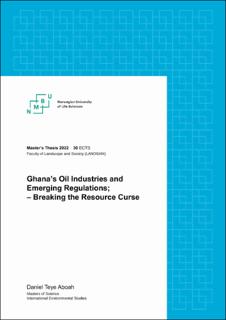| dc.description.abstract | The discovery of oil on the Ghanaian shores has been met with both a sense of opportunity as well as concerns on the possible repercussions of this discovery on economic growth and welfare. Today, the comparative advantages and relative abundance of a country’s natural resource base to some extent will influence the standard of living of the citizenry under the prevailing leadership of that country. The recent discovery of resource reserves by multinational companies within the Jubilee Field, around the Western coast of the country has seen Ghana move to join the club of Gulf of Guinea oil-rich countries. This development and discovery of oil have further spawned deliberations as to whether or not Ghana is in the right position and will be able to avoid the resource curse, a consequence viewed by many as a hurdle to cross. As indicated in an annual report from the Norwegian supported Oil for Development Programme (OFD, 2019), the ‘resource curse’ generally refers to a situational paradox where countries heavily endowed with natural resources appear to deliver poor results and a lack of development across a range of performance indicators also compared to less resource-rich countries.
This research study thus sought to study the oil industries in Ghana and emerging regulations, examining the various macroeconomic policies which govern their activities and how these policies could possibly translate into averting the resource curse. The research work adopted a qualitative research design in collecting and analysing the data needed to help answer the research questions. Purposive sampling was employed to choose the needed respondents. Primary data was collected using a semi-structured interview schedule. The Environmental Governance System Framework (EGS) was used as a framework to understand the underlying principles which generally shape the processes of policy formulation and their outcomes.
In Ghana, the governance of oil resources has been the mandate of the Ghana National Petroleum Corporation (GNPC) and the Petroleum Commission (PC). Findings from the study indicate that there is further collaboration between the regulatory agencies and other governmental institutions and oil exploration companies as well as with non-governmental agencies and donor agencies such as the Norwegian Agency for Development Cooperation (NORAD).
In terms of a resource curse, the country is faced with the lack of transparency in distribution of oil revenues and the lack of transparency in the award of concession and drilling rights. The country has also experienced various underlying factors which have led to a reduction in oil revenues as well as the nation’s GDP. These factors have been influenced by oil price fluctuations, a reduction in oil production due to technologies challenges and the intermittent oil disputes between Ghana and its neighbouring countries. Corruption, rent seeking and elite capture by some top public officials and politicians in the country have been unavoidable given the divergent agenda of the major political parties. The key governance discourses in Ghana have included civic environmentalism to a large extent and some form of green governmentality. Capacity building and the strengthening of institutions have been cited as being crucial to ensure the effective implementation of formulated policies, whilst streamlining agendas for the ruling governments. These approaches are considered as panaceas to effectively constrain the resource curse in Ghana. | en_US |

